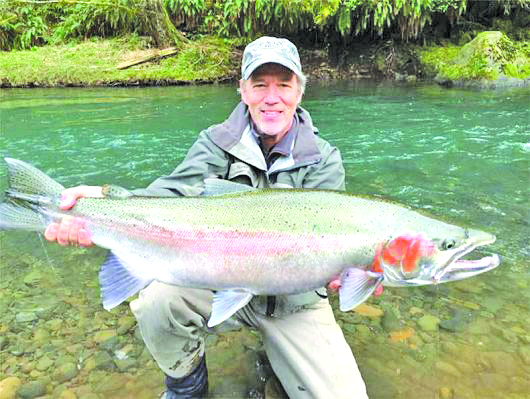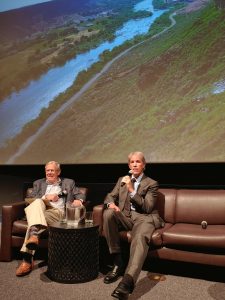
Even for one of the most prolific and celebrated writers in modern Hollywood history, this is a fish tale that seems so unlikely that only in the mind of David E. Kelley could it have been produced.
The Emmy Award winning producer appeared at the Aquarium of the Pacific Wednesday to announce a production of a different kind, saying he has founded a fish company to help save the planet from itself.
“Our world is in trouble,” said Kelley, as he offered facts indicating climate change and the world’s mushrooming population constitutes a grave threat to the global salmon population.
With 11 Emmys and more than 30 nominations, Kelley is best known for his monstrous television hits including “Ally McBeal”, “Boston Legal”, “Picket Fences”, “Big Little Lies”, “The Practice” and “L.A. Law,” among others.
Now, however, Kelley has tipped his toe into the river of sustainable fish farming, announcing he is the founder and Chairman of a company called Riverence, paying homage to the riversthat allow the salmon to thrive. Currently, he said, he considers the farm a philanthropic investment, but long-term, he said the company does plan to make a profit.
“The salmon is a miracle fish,” said Kelley, a lifelong fisherman. “They swim from the rivers to the oceans,” he said, “collecting thousands of nutrients before swimming back upstream feeding hundreds of species on land. As the salmon goes,” said Kelley, “so will we.”
Kelley, a lifelong fisherman, said it was the time in life to make a difference for the future.

Aquarium President and CEO Dr. Jerry Schubel, who opened the presentation, said the aquarium has offered its knowledge and expertise to Kelley. He applauded Kelley’s venture, saying that it will “decrease the pressure on wild salmon.”
In recent years, the Long Beach Aquarium has become one of the country’s top ocean attractions, along the way developing a special expertise in the “analysis and packaging of scientific data in forms that engage, educate and empower the public,” Schubel said.
As the world heats up, explosive algae blooms and “super bacteria” pose threats to the wild salmon population, they acknowledged.
Kelley said Riverence includes a state-of-the-art brood farm in Washington state, and eight aquaculture pins along the Snake River in Idaho, which contains some of the purest water in the country. “We are not water consumptive,” said Kelley, saying all water used by the farm is “returned to the earth.”
Riverence breeds and raises steelhead trout, a salmon cousin, and Kelley said the operation is currently selling about 10 million pounds of the fish per year. Kelley said they use molecular genetics for breeding, premium fish food and maintain pristine conditions in which their product is raised.
Purchasing fish food is the operation’s largest expense, said Kelley, prompting the celebrated Hollywood writer to quip,“I write television shows to buy fish food.”
During the panel discussion, top chef Andrew Zimmerman appeared in a video to offer praise to Kelley for “putting his money where his mouth is,” while noting that Riverence has produced “some of the most delicious trout I’ve ever tasted. It’s better than some of the wild stuff I’ve eaten.”
Kelley, with key members of his staff in the audience, said he is taking his role as CEO very seriously. Kelley said he grew up on a farm in Maine so, in essence, he is simply returning to his roots. “I guess like a salmon,” he said, “I’m sort of returning upriver to the stream I began on and have returned to farm life.”
Having said that, Kelley said his company will not be run like many companies that he claims do not employ corporate social responsibility.
“Part of the problem,” said Kelley, “is that in the corporate world you’ve got people in short-term tenure jobs making decisions that will affect the world forever.”
Dr. Halley Froehlich, assistant professor, University of California, Santa Barbara, an expert on sustainable offshore aquaculture, said companies like Riverence will have a significant impact on the country’s seafood market. The U.S. currently imports 95 percent of its seafood by value and more than 60 percent by volume, she said.
Kimberly Thompson, director of the Aquarium’s “Seafood of the Future” program, conducted the final portion of the presentation, focusing the discussion on the need for responsible aquaculture and conservation.
“By trade I am a storyteller,” said Kelley, “writing about flawed characters struggling with the value judgments they made.” Before that, he said, “I was a lawyer. What I loved about the law is that, as imperfect as it is, it is the best mechanism we have for legislating ethical behavior and morality.”
Despite his long string of hits, Kelley said he has yet to find the “springboard” to bring fish farming to the screen. “I ask my wife (Michelle Pfeiffer) every week,” said Kelley, “and she says…honey, no.” Appeals to their daughter meet with the same response, said Kelley with a smile.
So now, however, Kelley said he will focus with renewed intensity on making Riverence a premium product for American restaurants, and eventually, for the direct consuming public. He said he began going to aquaculture conferences five years ago and now “I’m trying to protect and save something bigger than myself.”
“With 10 billion people expected on the planet by 2020,” said Kelley, “something’s got to give. And unless we can come up with a (protein) alternative, it’s going to be the salmon.”
